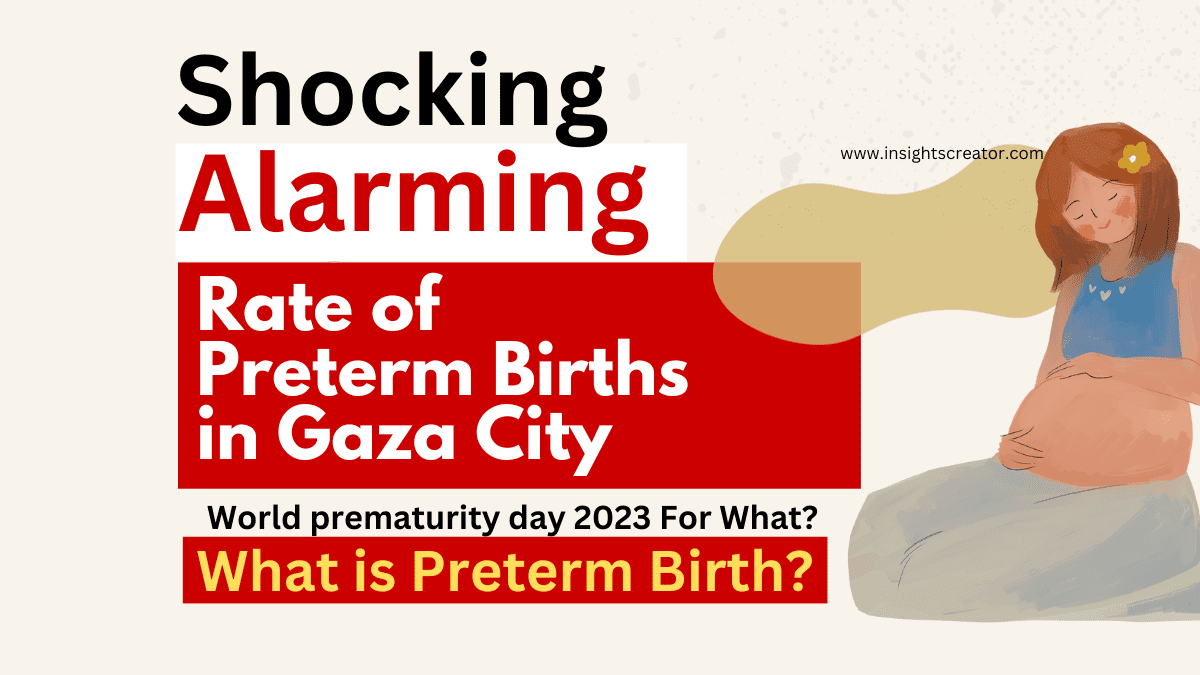Contents
The Alarming Rate of Preterm Births in Gaza City
Gaza City Preterm Birth: In the bustling city of Gaza, a hidden crisis silently looms – preterm birth. Prematurity, defined as giving birth before 37 weeks of gestation, poses a significant challenge in Gaza City. This article explores the causes, consequences, and potential solutions to address the alarming rate of preterm births in this region.

Causes of Preterm Births
Premature births can occur due to various factors. Understanding the root causes is crucial in combating this problem effectively.
Underlying Health Conditions
- Maternal health plays a vital role in pregnancy outcomes. Chronic conditions like diabetes, hypertension, and obesity can increase the risk of preterm labor.
- Infections during pregnancy, such as urinary or vaginal infections, can trigger early contractions and premature birth.
- Inadequate prenatal care and limited access to quality healthcare facilities contribute to the prevalence of preterm births in Gaza City.
Socioeconomic Factors
- Socioeconomic disparities within Gaza City can impact pregnancy outcomes. Women living in poverty face increased stress levels, food insecurity, and limited access to proper nutrition, increasing the risk of preterm birth.
- Exposure to violence and political unrest can also contribute to high stress levels in pregnant women, potentially leading to preterm labor.
New Tuberculosis Vaccine -Treatments of Tuberculosis- Don’t Lose Hope
Consequences of Preterm Births
Preterm births carry short-term and long-term consequences for both infants and their families.
Immediate Complications
- Preterm infants often require specialized care and intensive support due to their underdeveloped organs and low birth weight.
- Respiratory distress syndrome, necrotizing enterocolitis (a severe intestinal disease), and intraventricular hemorrhage are common complications faced by premature babies.
- Preterm births can lead to long hospital stays, incurring significant financial burdens on families.
Long-term Impact
- Neurodevelopmental problems, including cognitive impairments, learning disabilities, and behavioral issues, are potential long-term consequences for preterm infants.
- These children may also face respiratory problems, vision or hearing impairments, and a higher risk of chronic diseases compared to those born full-term.
- The emotional toll on families, including increased stress, anxiety, and financial strain, cannot be understated.
Addressing the Crisis
To combat the alarming rate of preterm births in Gaza City, a multi-faceted approach is required.
Enhanced Prenatal Care
- Increased access to prenatal care services, including regular check-ups, health education, and the early identification and management of risk factors, is crucial.
- Collaborative efforts between healthcare providers, community organizations, and government agencies can ensure comprehensive and holistic antenatal care for all pregnant women in Gaza City.
Nutritional Support
- Promoting adequate nutrition for pregnant women through programs that provide access to essential prenatal vitamins and supplements can help improve birth outcomes.
- Encouraging breastfeeding and educating mothers on its importance can enhance the health and well-being of preterm infants.
Mental Health Support
- Recognizing the impact of stress on pregnancy and promoting mental health support services for pregnant women is vital.
- Community-based interventions such as counseling, therapy, and support groups can help alleviate stress and improve overall maternal well-being.

Conclusion
Preterm births continue to pose a significant challenge in Gaza City, requiring urgent attention and collaborative efforts from healthcare providers, policymakers, and the wider community. By addressing the underlying causes, ensuring access to quality prenatal care, and providing comprehensive support to mothers and their families, it is possible to reduce the rate of preterm births and improve the long-term outcomes for these vulnerable infants. Together, we can strive towards a healthier and brighter future for Gaza City.
“Every baby deserves a fighting chance at a healthy start in life.” – Source
External Links:
World Prematurity Day is observed on November 17th each year to raise awareness about the challenges faced by premature babies and their families. In 2023, the focus of this significant day is on preterm births in Gaza. The region of Gaza has been plagued by numerous hardships, including political conflicts and limited access to healthcare resources.
Sadly, these circumstances have contributed to an increase in preterm births, putting the lives of newborns at risk. On this World Prematurity Day, it is crucial to shed light on the urgent need for improved healthcare facilities, specialized neonatal care, and increased support for families with premature babies in Gaza. It is a time to advocate for better resources and initiatives to ensure healthier outcomes for these vulnerable infants, who deserve the best possible start in life.


